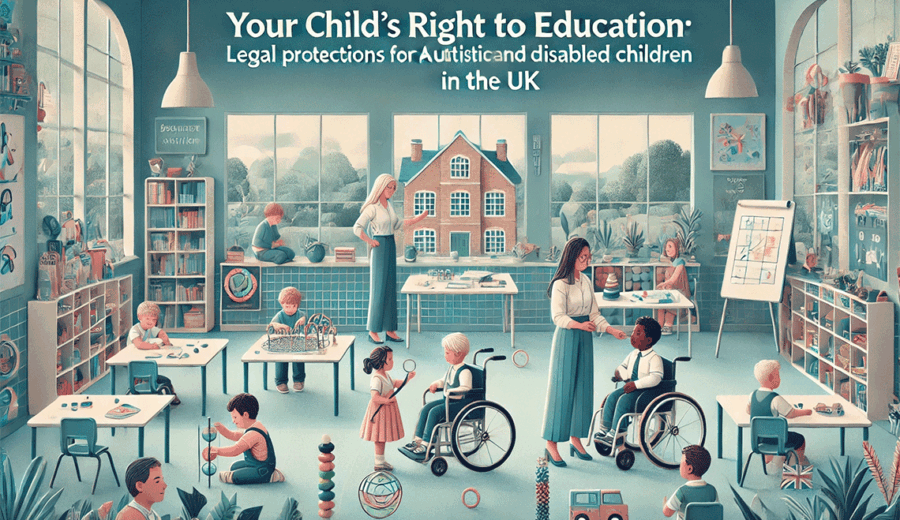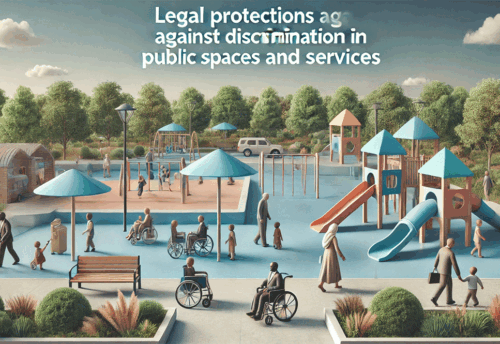
November 26, 2024
Your Child’s Right to Education
Your Child’s Right to Education: Legal Protections for Autistic and Disabled Children in the UK
Education is a fundamental right for all children, and the UK has robust laws and systems in place to ensure that autistic and disabled children receive the support they need to thrive. Parents often face challenges in navigating the educational landscape, but understanding your child’s legal protections can empower you to advocate for their needs effectively.
Key Legal Frameworks Protecting Education Rights
Several laws and guidelines provide the foundation for educational rights in the UK:
1. The Equality Act 2010
- Protects autistic and disabled children from discrimination in all educational settings, including nurseries, schools, colleges, and universities.
- Requires schools to make “reasonable adjustments” to support children with disabilities and prevent disadvantage.
- Covers protection against direct and indirect discrimination, harassment, and victimization in educational settings.
2. Children and Families Act 2014
- Introduced the Education, Health, and Care Plan (EHCP) system, replacing Statements of Special Educational Needs.
- Ensures collaboration between education, health, and social care to meet the needs of children with disabilities.
- Empowers parents to play an active role in their child’s educational planning.
3. SEND Code of Practice (2015)
- Provides statutory guidance for local authorities and schools on supporting children with Special Educational Needs and Disabilities (SEND).
- Focuses on inclusive education, early intervention, and a child-centered approach to learning.
Education Rights for Autistic and Disabled Children
1. Access to Free and Appropriate Education
- Every child has the right to a free education up to the age of 18, regardless of their disability or additional needs.
- Local authorities must provide suitable educational placements, whether in mainstream schools, special schools, or home education settings.
2. Education, Health, and Care Plans (EHCPs)
- What is an EHCP? A legally binding document outlining a child’s specific needs, desired outcomes, and the support required to achieve them.
- Who Qualifies? Children whose needs cannot be met through standard SEND support in mainstream schools.
- How to Apply? Parents can request an EHCP assessment through their local council. Schools, nurseries, or healthcare professionals can also initiate the process.
- Key Features: EHCPs are reviewed annually to ensure the child’s needs are being met.
3. Inclusion in Mainstream Education
- Schools must adopt inclusive practices, ensuring autistic and disabled children can learn alongside their peers.
- Reasonable adjustments may include providing teaching assistants, sensory-friendly classrooms, or alternative communication methods.
- Exclusion based on disability-related behaviors is illegal unless all reasonable adjustments have been explored.
4. Specialist Educational Settings
- Parents have the right to request placement in a special school if a mainstream setting cannot meet their child’s needs.
- Specialist schools focus on tailored education plans, smaller class sizes, and therapies such as speech or occupational therapy.
5. Transition Support
- Schools are legally required to provide support during key transitions, such as moving from primary to secondary education or preparing for adulthood.
- Transition plans, often included in EHCPs, address the child’s future goals and skills development.
How Schools Must Support Your Child
1. Reasonable Adjustments
- Flexible teaching methods (e.g., visual aids, sensory breaks).
- Accessible facilities, such as ramps, lifts, and quiet areas.
- Adjustments in assessments, like extra time or alternative formats.
2. SEND Support Without an EHCP
- For children who don’t qualify for an EHCP, schools still have a duty to provide targeted support through the SEND framework.
- This includes personalized learning plans, one-on-one support, and collaboration with external specialists.
3. Safeguarding Against Discrimination
- Schools must ensure that policies and practices do not disadvantage disabled children.
- Parents can file formal complaints if they believe their child has faced unfair treatment.
Parental Rights and Responsibilities
1. Right to Appeal Decisions
- Parents can appeal to the First-tier Tribunal (Special Educational Needs and Disability) if an EHCP is refused or if they disagree with its content.
- Mediation services are available to resolve disputes amicably.
2. Active Participation
- Parents have the right to be involved in all aspects of their child’s educational planning, from drafting EHCPs to selecting a school.
3. Home Education
- Parents may choose to educate their child at home if they feel the school system cannot meet their needs. Local councils are required to provide support and ensure the education is suitable.
Support Services for Parents
- Independent Supporters: Offer guidance on navigating the EHCP process.
- Parent Carer Forums: Provide peer support and advice on SEND matters.
- Charities and Advocacy Groups: Organizations like IPSEA, Contact, and the National Autistic Society provide expert advice and resources.
What to Do If Your Child’s Needs Are Not Being Met
- Discuss concerns with the school’s SEND coordinator (SENCO).
- Request an EHCP assessment if necessary.
- File a complaint with the local authority or school governors if issues persist.
- Seek legal advice or representation for appeals and disputes.





Leave a Reply